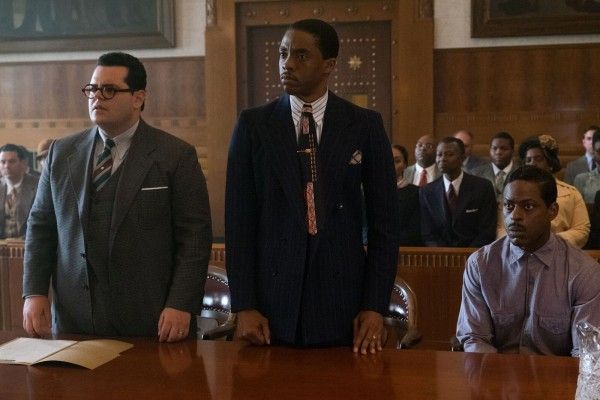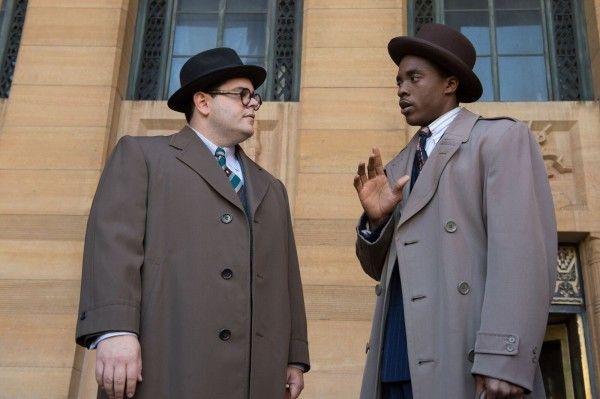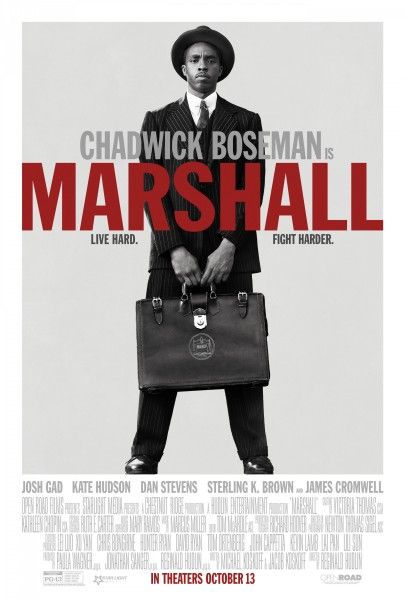Thurgood Marshall deserves a miniseries on the scale of John Adams. His story is remarkable and even if Reginald Hudlin’s Marshall had been a great movie, it still wouldn’t be enough to contain the litigator and Supreme Court Justice’s many achievements. As it is, Marshall feels like it’s only skimming the surface of its title character’s legacy, serving at best as an introduction but by no means the robust biopic its towering central figure deserves. If anything, Marshall’s story is reduced down to half the tale and his purpose seems to be as a guide for a reluctant white litigator. Of all the stories that could have been made about Thurgood Marshall, it’s a bit baffling they chose this one.
In 1941 in Bridgeport, Connecticut, chauffeur Joseph Spell (Sterling K. Brown) is arrested for the rape and attempted murder of wealthy white woman Eleanor Strubing (Kate Hudson). The NAACP sends its only lawyer, Thurgood Marshall (Chadwick Boseman), to investigate, see if Spell has been wrongly accused, and if so, defend him. In order to defend Spell in court, Marshall needs an application from an in-state attorney. Local insurance attorney Sam Friedman (Josh Gad) becomes roped into the situation when his brother volunteers Sam to apply on behalf of Marshall. Friedman’s plans to hand the case off to Marshall are dashed when Judge Foster (James Cromwell) only allows Marshall to be co-council and forces an untested Friedman to try the case. Friedman and Marshall begin an uneasy partnership where Friedman feels his reputation in the community could be ruined and Marshall feels like Friedman’s inexperience will blow the case.
In its broad strokes, you can see the good intentions of Marshall in that it’s trying to convey that racism happens anywhere (it’s not contained just to the South) and that white people like Friedman can join the crusade due to the persuasive power of someone like Marshall. And yet that somehow seems slight and ineffective, reducing the story of Marshall down to a PSA about how it’s important for white people to join with black people to combat racism. I agree that’s important, but for a movie called “Marshall”, it’s a shame to see his character relegated to, while not a supporting role, someone whose duty it is to help the white guy.
To the film’s credit, it tries carving out Marshall and Friedman as separately strong characters who do not immediately hit it off. While Marshall is an unabashedly heroic figure, Boseman’s performance still gives weight to the character and isn’t afraid to make him unlikable even if, from a script level, Marshall’s greatest flaw is he’s too devoted to his cause. Additionally, Friedman’s not painted as cowardly as much as he’s someone who clearly has something to lose. Marshall will move on to the next town after this case, but Friedman will forever be associated with his actions, and while we can now look back and see him doing the right thing, it was understandably scary at the time.
This kind of simple presentation make Marshall ideal for middle-school students who want to learn the beginnings of one of the most important civil rights figures in American history, but it’s by no means comprehensive or detailed. It’s a Beginners Guide to Thurgood Marshall wrapped in a courthouse drama where the moral of the story is that white people need to ally with people of color against racism. That’s fine, but Thurgood Marshall deserves so much better than a “fine” biopic.
Rating: C




